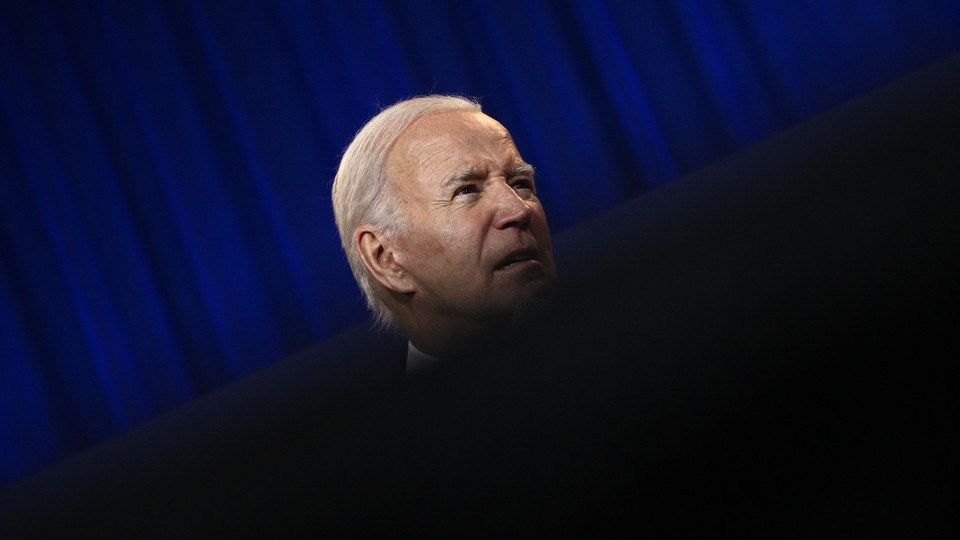A Scheme for Biden to Preserve His Dignity
4 min read
Senility is part of the human condition, but dignity is usually a choice. I pity Joe Biden for having to make what may be the most humiliating decision in presidential history. The questions Are you senile yet? Are you sure? have no dignified answer—which is why Biden should consider an option midway between resignation and denial, and persist in a way that is not, to my knowledge, being considered.
Having harvested enough delegates for the nomination, he now has sole authority to release them and let them choose another nominee at or before the Democratic National Convention in August. To release them and glide toward retirement would invite speculation about whether being unfit to run for president means he is also unfit to serve as president for the rest of his term. Failure to release them would feel a lot like Biden is holding the party hostage, and forcing its members to defend his debility with such preposterous vigor that no one will believe anything they say ever again.
The dignity-preserving option is to release the delegates and run in an open convention. Asking the country to trust him is no longer a credible option. But inviting delegates to witness his continued vigor and competence, and his superiority to other candidates, is a possible path forward—indeed, the likeliest one to end in another Biden term. He would have to give a speech to explain this choice. It might go something like this: You saw me looking old. For the next month you’ll see much younger Democrats and Republicans eating my dust. And if in August, my party thinks this old man is ready for retirement, I’ll be thrilled to finish my term, support the nominee, and work on my golf handicap come January.
Only one cognitive test really matters, and that is the test administered by voters over the course of a campaign, and scored by them in the booth after seeing a candidate dominate or falter. Biden’s decline seems either to have been hidden from the public or to have come relatively quickly, too fast for the primary season to reveal it in full. (This second possibility is, incidentally, why I consider him unqualified for a second term: We all age slowly, and in some ways get better at decision making as we age slowly. But sudden fast-aging is a sign of impending catastrophe, so whenever there is any evidence of it, an old president should resign.) Biden would be offering them, through their party proxies, a second chance to stress-test his frontal lobes.
The alleged downside of this option, or any option that leads to an open convention, is that the Democrats would waste time and money fighting one another when they could be fighting Donald Trump. This argument reminds me of a cornball line I heard from Tom Harkin, then the Democratic senator from Iowa, when his party was watching with concern as Barack Obama vigorously contested Hillary Clinton’s sovereign right to the Democratic presidential nomination in 2008. “When I was a boy,” Harkin said, “I heard cats yowling underneath the porch.” They sounded like they might be killing each other, so he reported his concern to his mother. “Don’t worry,” she told him. “It just means that there are going to be more cats.” Competition is healthy, and what sounds to naive ears like a death match is an essential step in the propagation and survival of the party.
I’m not sure what to say to someone who thinks the Democratic Party’s problem is that it has been too open to debate, internal competition, and challenges from outsiders. Maybe they are confusing themselves with members of the politburo. More likely, I think, the party that is poised to nominate an 81-year-old career politician would benefit from a season of intense open auditions—to figure out which junior talent deserves promotion, which senior talent deserves retirement, which policies animate the party’s supporters, and which policies should go. The candidates who emerge with the most support from this compressed process—which would be the most-watched gladiatorial match in American political history—will be the party’s future.
The Republicans underwent this process in 2016, when Trump dispatched candidate after candidate and showed beyond denying that theirs was the party of immigration restriction and protectionism. I fully expect the Democrats to reveal themselves enthusiastic about policies worse than Biden’s in a number of ways. But if they do, they were that party all along.
And Biden will either continue or conclude his career with a fight. I predict he will lose it, and badly. In some ways that would be the ideal outcome for him, too: to lose by invigorating his party; to lose by picking a fight instead of dodging one; to avoid the fate of winning and then spending the next few years being publicly monitored for drooling and signs of disorientation. Dignity is a choice, but not a choice that remains available forever.



